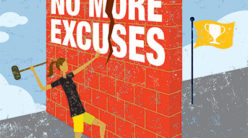I’d made up my mind; I was going to lose weight, change my eating habits, and start an exercise program. Like my prior attempts, four days into my new lifestyle my enthusiasm began to wane. I reached for the cookie canister. Who would know? Or more important, who would care if I cheated, or just gave up? The phone rang; it was Susan, my friend, my weight-loss partner. She must have heard that weakness in my voice . . . for she knew.
“You’re going for the cookies, aren’t you?” she asked.
I leaned against the kitchen counter and sighed.
“Don’t do it,” she said. “Eat a piece of fruit. Remember how good you said those apples tasted yesterday? We agreed to weigh in in three days. How about if I meet you at the park in 30 minutes? We’ll walk. Remember what you told me yesterday when I wanted that chocolate bar? `Exercise curbs your appetite.’ Come on, don’t let me down; I need you. We can do this.”
I smiled, agreed to meet her, then taking her earlier advice, I hid the cookie canister in the pantry. Susan was right. I could do this. Or rather, we could do this. Together we found the strength and the willpower to change our eating habits and follow a regular exercising routine. The key to our success wasn’t a pill, or a diet shake; it was teamwork.
For too long Americans have attempted to be the one-person power machine, too independent to take on a partner or request a helping hand. The results are high stress, burnout, and relinquishing goals that would otherwise have been attainable. Recognizing this, American teachers, business advisers, and counselors are promoting the advantages of teamwork.
“Having a partner who offers support and encouragement is one of the key elements to altering behavior patterns,” says Linda Free-Gardiner, author of Trust the Process: How to Enhance Recovery and Prevent Relapse. “Where one alone might fail, a functioning team can create a hurricane of energy and willpower, making monumental tasks appear less intimidating.”
In 1991 a 31-member commission created by the Labor Department reported that schools must start teaching cognitive skills such as teamwork. Laura Powell, writer and Teacher of the Year for the Humble, Texas, Independent School District, is also an advocate of teamwork.
“When facing a dilemma, whether it’s in education or personal affairs, the perspec- tives of two people offer problem-solving strategies that one alone could never contemplate,” Powell says, “No matter what elementary math has taught you, in teamwork one plus one will always be greater than two.”
Mark Sanborn, author of Teambuilt: Making Teamwork Work, points out the corporate advantages of teamwork. “Today many of the most successfully managed companies in America credit their results to teamwork (companies such as Boeing, General Electric, and Procter and Gamble). Teamwork makes sense to these successful organizations because they’ve found it can impact practically every aspect of performance.” When it’s a two-person team Mr. Sanborn calls it “power partnering.” “The same teamwork skills that contribute to organization excellence can create personal excellence.”
Whether it’s acing a test, building a career, overcoming an addiction, or trying to get in shape, the results seem to be clear. When two people join together with a common goal, they’ll be able to accomplish things that one alone cannot.






